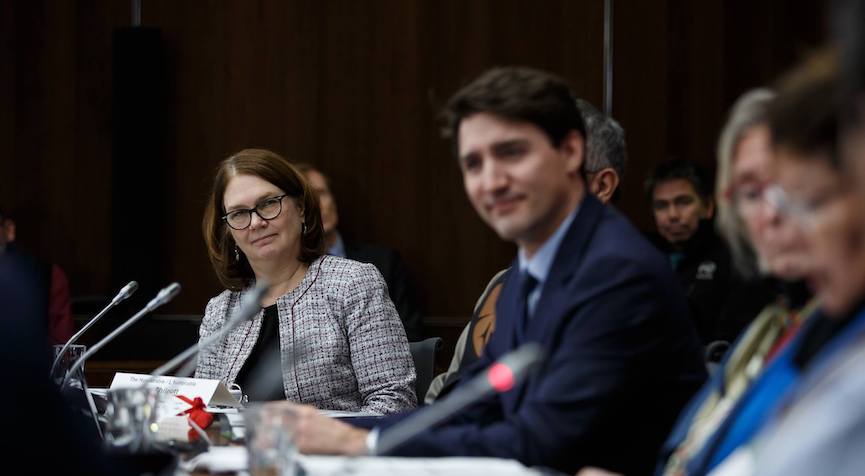Invocations of the “rule of law” are reassuring to many Canadians. Implicit is the sense that, young or old, weak or powerful, we are all equal before the law. A rich person who has committed a crime will be punished; a poor person who is wronged will have restitution.
If only it were so.
For anyone who still had any allusions, last week’s testimony by former Minister of Justice and Attorney General Jody Wilson-Raybould laid bare our Liberal government’s problematic understanding and application of the rule of law.
Of course, if you’re a person of colour, a woman, or an Indigenous person in Canada, you’ve long had reason to question the supposed inviolable nature of the “rule of law.” Those who scrutinize our international dealings also have reason to question Canada’s commitment to the rule of law.
To be clear, the current government is not the only Canadian government to have a shaky relationship with the rule of law. But through Wilson-Raybould’s testimony, there is much that can be learned about our powerbrokers’ attitude toward the rule of law, when they believe the law can be ignored, and how to finesse such violations.
At issue was whether, in the case of securing a deferred prosecution agreement for SNC-Lavalin, Wilson-Raybould as attorney general should be able to make a decision free of political interference. According to Wilson-Raybould, there was a “barrage” of players “hounding” her and her staff on the matter, including Prime Minster Justin Trudeau and several of his key advisors.
At one point, Trudeau’s top advisor Gerald Butts complained to Wilson-Raybould that the law governing her actions “was set up by [the Harper government]” and that he “does not like the law.” So according to Butts, if you don’t like a law, or the people who wrote it, you’re free to ignore it. Try that the next time you get stopped for a traffic ticket.
Butts and fellow Trudeau’s Chief of Staff Katie Telford told Wilson-Raybould’s staff that she should have her decision reviewed by an ex-Supreme Court judge, presumably because a judge of their choosing might just happen to side with the Prime Minister. In any case, they felt it would “give us cover in the business community and legal community,” as if the business or legal community needed to approve of the decisions of the attorney general.
Butts and Telford also assured Wilson-Raybould’s staff that if she were nervous about meddling in the case, they would “line up all kinds of people to write op-eds saying that what she is doing is proper.” With this reasoning, it’s okay to break the law if you can get enough influential people to agree with you.
If laws can be ignored if enough people disagree with them, how is it that Foreign Affairs Minister Chrystia Freeland used the “rule of law” argument to justify the December arrest of Meng Wanzhou, Huawei’s chief financial officer?
If the rule of law is so easily circumvented for SNC-Lavalin, how can it be the government’s main justification for forcefully removing Indigenous protesters opposing a pipeline on their land in British Columbia in January?
In the face of the political interference she faced, Wilson-Raybould testified, “We either have a system that is based on the rule of law […] and respect for those charged to use their discretion and power in particular ways — or we do not.”
Unfortunately, it’s clear we do not have a system that’s based in the rule of law. As Hayden King of the Yellowhead Institute postulates with the Wilson-Raybould affair, “it’s hard not to believe” that similar cases of political interference aren’t happening all the time.
This government, like many before it, simply gives lip service to the rule of law. It’s a selective game, where the “rule of law” applies to opponents and critics, but only exceptionally to political allies or party donors.
It’s why the rule of law is invoked to justify Canada’s forceful position against Russia’s annexation of the Crimea, but why the “rule of law” is ignored with Israel’s annexation of East Jerusalem. This past month, the House even passed a free trade bill with Israel, despite that country’s decades-long human rights violations.
It’s why successive Conservative and Liberal governments refuse to abandon our $15 billion arms sale to Saudi Arabia, despite that country’s litany of crimes in its war in Yemen. As a former Trudeau advisor opposed to the deal described it, either we “stand up for the rule of law [on Saudi Arabia] or succumb to the law of the jungle.”
Alas, despite everything Trudeau, Freeland or others might assert, it’s the law of the jungle that defines our backroom deals and international relations. One can only hope that in the wake of the Wilson-Raybould’s affair, more Canadians will be sceptical the next time government justifies a questionable decision based on the “rule of law.”
Image: Justin Trudeau/Facebook
Help make rabble sustainable. Please consider supporting our work with a monthly donation. Support rabble.ca today for as little as $1 per month!





